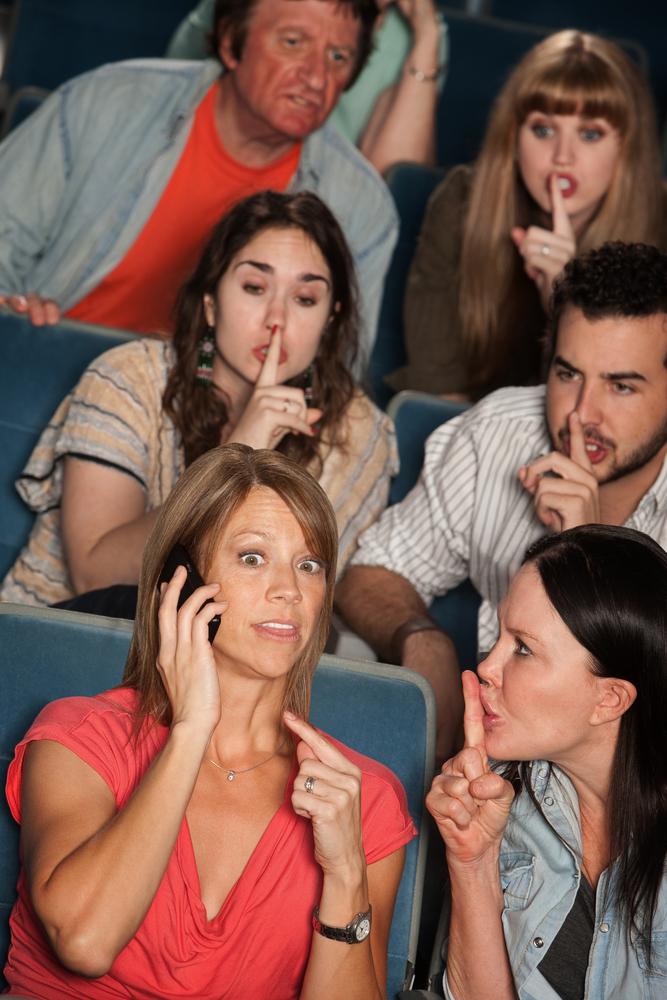Anil Dash, a self-described “entrepreneur, writer and geek” penned a lengthy message to certain members of the moviegoing public on his blog this morning. Inspired by the current debate over whether or not texting should be allowed in theaters, Dash decided to throw his hat into the ring, and has declared “shushers”—those on the side of prohibiting cell phone usage and talking back at the screen during movies—to be the Debbie Downers of the moviegoing experience. Shushers, according to him, represent everything that’s wrong with the world, on par with slavery defenders, marriage equality opponents, and anyone who thinks a woman shouldn’t wear pants.
Seriously—those are the analogies he uses. Unsurprisingly, this caused an avid Twitter debate among film critics and moviegoers alike. Dash gets a lot of things wrong with his argument—he assumes, for instance, that those of us who prefer to watch our movies without seeing a tiny flashing light emanating from your lap are completely unsympathetic to the ways different people watch movies. And he argues that because movie theaters are a public space, people should be able to treat it the way they would “any other public space.” Yet in all public spaces, there are standard, agreed-upon rules of etiquette which involve respecting the space and wishes of others around you.
Which brings me to the most ridiculous claim in his post: that shushers are “outnumbered” by millions of moviegoers around the world.
The most popular film industry in the world by viewers is Bollywood, with twice as many tickets sold in a given year there as in the United States. And the thing is, my people do not give a damn about what’s on the screen.
Indian folks get up, talk to each other, answer phone calls, see what snacks there are to eat, arrange marriages for their children, spontaneously break out in song and fall asleep. And that’s during weddings! If Indian food had an equivalent to smores, people would be toasting that shit up on top of the pyre at funerals. So you better believe they’re doing some texting during movies.
Though I’ve never been to India, I have no doubt that India’s culture, as well as other cultures around the world, permits and even encourages this kind of experience. In fact, from time to time, if I intend to see a silly and/or fun movie in the vein of say, Pain & Gain (or really anything by Michael Bay), I will deliberately seek out a theater that attracts and encourages the type of enthusiastic viewers who will ultimately add to my enjoyment of the film with their hilarious ad libs. In my case, the Magic Johnson Theatre in Harlem is perfect for these viewings, because the majority of the people who go there long ago set the status quo—no one will shush you if you start talking on your phone in the middle of the movie. The same goes for midnight screenings of blockbusters and the unique experience of checking out a Rocky Horror Picture Show sing-along.
But in most theater experiences in the U.S., the people who text or don’t turn their phones on silent are in the minority—which is why, before every movie you go to, there’s a PSA reminding you not to text or talk in theaters. There’s some room for flexibility here, of course; I think most people will concur that there is a general hierarchy within the moviegoing experience that more or less correlates with our perceived hierarchy of cinema. If you’re seeing Transformers, a movie Dash refers to, no one—even us shushers—is really going to care if you’re texting or getting really excited and shouting at the screen. But if you’re going to see Amour and decide to check your phone or chat with the person next to you, you’d better believe everyone around you is going to be annoyed. It’s distracting.
Richard Lawson puts it correctly when he states that Dash’s tirade against shushers is “the ultimate way to shut down what had been a reasonably amiable disagreement about everyday public manners.” Indeed, there have been middle-of-the-road suggestions for separate text-approved screenings, and most of us on both sides of the argument are willing to find similar compromises. But Dash refuses to acknowledge that such people exist—and only makes his side look worse in the process.
